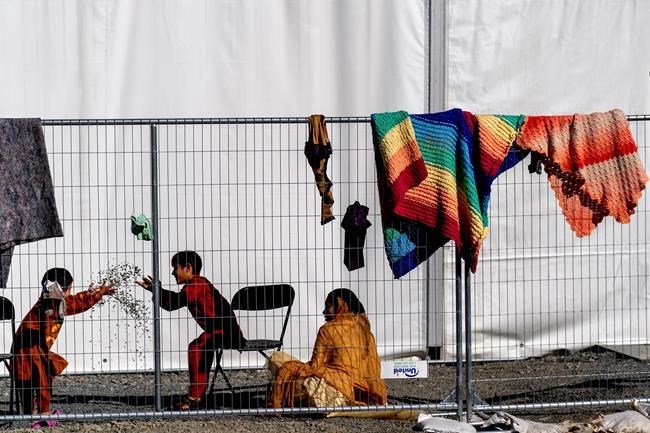
Children play with stones at an Afghan refugees camp on Joint Base McGuire Dix Lakehurst, N.J., on Monday, Sept. 27, 2021. The camp currently holds about 9,400 Afghan refugees and has a capacity to hold up to 13,000. THE CANADIAN PRESS/AP-Andrew Harnik
October 01, 2023 - 1:00 AM
OTTAWA - Save the Children's global advocate says Canada could lead an effort to have youth steer the reform of global institutions to fight climate change, while urging Ottawa to reverse aid cuts.
"Canada is uniquely placed today to really help the world to lead differently, to help young people to find hope for the future," said Rotimy Djossaya, the charity's global policy head, during a recent visit to Ottawa.
"Canada can play a critical role in ensuring that the world is prioritizing gender and human rights."
In mid-September, leaders gathered at the United Nations to take stock of the Sustainable Development Goals, a set of objectives such as gender equality, ending extreme poverty and ensuring a quality secondary education for every child. The goals involve 140 specific targets agreed upon in 2015, to be achieved by 2030.
Yet the United Nations says just 15 per cent of those targets have been reached, and 193 countries have agreed to speed up progress over the remaining seven years.
"We are off track. So, we need leaders; we need commitment," Djossaya said.
In the case of Canada, Djossaya said a feminist international aid policy has inspired other countries to take gender equality seriously, and to reform how they fund projects in developing countries in order to empower groups on the ground.
Yet he said the funding Canada has promised and the timelines it has set out do not account for the challenges these countries are facing, or the targets set out by the United Nations.
In this spring's budget, the Liberals earmarked a $1.3-billion drop in funding, amounting to 15 per cent less than the year before.
The Trudeau government insists this is not a cut, since the budget remains larger than Canada's aid expenditures before the COVID-19 pandemic and Russia's invasion of Ukraine. But it fits a trend of western countries pulling back on aid spending amid a series of climate disasters and refugee crises.
Those trends are hitting children hard, Djossaya said. His organization has surveyed 54,000 children across 41 countries, and found they roundly feel adults aren't doing enough to deal with what they perceive as increasing inequality and climate chaos.
"They are struggling to understand the world that we'll live in tomorrow. They are struggling to understand the unprecedented scale of the impact of climate change of natural disasters," Djossaya said.
This month, the Overseas Development Institute said Canada has contributed just 51 per cent of its "fair share" of the billions needed to help countries adapt to climate change, based on greenhouse gas emissions, gross national income and population size.
Meanwhile, in August the UN High Commissioner for Human Rights stated that inaction on climate change amounts to violation of the Convention on the Rights of the Child that virtually every country adheres to, which gives more teeth to legal challenges of governments that don't take climate change seriously.
"There's an urgent need for us to step up," Djossaya said. "How are we using the tools to really deliver, for the next generation, a livable planet? It's for me something which is alarming."
At the United Nations, Canada has argued there is not enough funding available to poorer countries to meet these targets, particularly those coping with increasing natural disasters associated with climate change.
For example, about 60 per cent of people in Africa don't have access to early-warning systems to help them escape disasters, according to the World Meteorological Organization.
Ottawa has argued the most viable way to face these types of challenges is to reform global financial institutions, to give more financing for carbon-neutral infrastructure that better protects these countries from hurricanes and wildfires.
Djossaya said those reforms are crucial, but Canada and its peers shouldn't shirk their own responsibilities.
He noted an underfunded program in Burkina Faso designed by young adults, to make sure that families on the move due to climate change can make sure their children keep up with their schooling, through a network of schools in various regions that can integrate kids who had to move partway through a school year.
That program is in a region where young people are facing limited opportunities, and are recruited by terrorist groups.
"The only way to be successful … is to really put the children and young people themselves at the heart of the solutions," Djossaya said.
"We don't have time to lose. We need to act now, and make sure that we are shaping a world which will remain livable for the generations to come."
International Development Minister Ahmed Hussen wouldn't say whether Ottawa will further boost its current aid allocation, but he noted the United Nations has put Canada as one of the leaders of an advocacy project for the Sustainable Development Goals.
"Canada is actually leading in this space," Hussen said. "This is not the time to pivot … we are at the halfway point and if we work hard, we can get the job done."
This report by The Canadian Press was first published Oct. 1, 2023.
News from © The Canadian Press, 2023